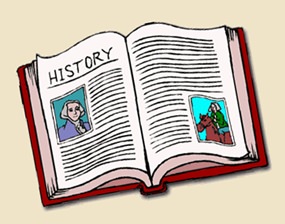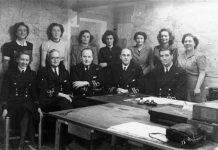Today is Saturday, April 16, the 107th day of 2015. There are 259 days left in the year.
Highlights in history on this date:
1746 – The Duke of Cumberland at the Battle of Culloden defeats the last Scottish rebellion seeking the reinstatement of the Stuart dynasty.
1804 – War between British East India Company and Holkar of Indore begins in India.
1818 – The Rush-Bagot agreement is ratified between the U.S. and Canada which leads to the creation of the world’s largest demilitarized, unfortified national border.

1856 – Declaration of Paris abolishes privateering, defines nature of contraband and blockade, and recognizes principle of “free ships, free goods.”
1862 – France’s Napoleon III declares war against Benito Juarez, the Mexican leader.
1900 – The first books of U.S. postage stamps are issued.
1906 – Pacific cable between United States and China is completed.
1917 – Vladimir Ilyich Lenin returns to Russia after years of exile.
1922 – Treaty of Rapallo between Germany and the Soviet Union recognizes the Soviet Union as a “great power” and leads to resumption of diplomatic and trade relations.
1942 – India’s Congress party rejects terms of self-government offered by Britain.
1944 – The city of Seattle, Washington, suffers a severe labor shortage.
1945 – U.S. troops enter Nuremberg, Germany, in World War II; in his first speech to Congress, President Harry S. Truman pledges to carry out the war and peace policies of his predecessor, President Franklin D. Roosevelt.
1947 – Fires and explosions wreck Texas City, Texas, as French freighter Grandcamp loaded with ammonium nitrate fertilizer blows up. Another ship explodes the next day. The disaster kills more than 500 people and leaves 200 others missing.
1964 – Nationalist leader Joshua Nkomo is placed under restrictions in Southern Rhodesia.
1970 – Alpine avalanche plunges down on children’s sanitarium at Sallanches, France, killing 72 people.
1975 – Cambodian government in Phnom Penh asks for truce and offers to yield to Khmer Rouge forces sweeping into city.
1987 – The U.S. Federal Communications Commission warns broadcasters it plans to impose a broader definition of indecency over the airwaves.
1988 – Israeli commando unit, commanded by Ehud Barak — later to become prime minister — kills Palestine Liberation Organization military commander Abu Jihad in Tunis.
1989 – Three bomb blasts on fifth day of cease-fire kills one man and injures 20 people in Colombo, Sri Lanka.
1992 – President Najibullah of Afghanistan, stripped of power, is stopped trying to flee the country.
1993 – Bosnian Serbs agree to allow Canadian peacekeeping troops to enter besieged Muslim enclave of Srebrenica.
1994 – A British warplane is shot down on a NATO mission over the embattled town of Gorazde, Bosnia.
1995 – Iraq begins preparing its citizens for more hardships after formally rejecting a U.N. offer to sell $2 billion worth of oil to buy food and medicine.
1997 – Police recommend indicting Israeli Prime Minister Benjamin Netanyahu in a corruption scandal.
1999 – Abdelaziz Bouteflika, favored by the powerful military, wins the presidency of Algeria. His opponents, who withdrew to protest voter fraud, call the election a sham.
2000 – Two containers believed to hold pepper gas are hurled inside a crowded nightclub in Portugal just as the electricity is cut, killing seven people and injuring 35 others.
2001 – Israel launches an airstrike against a Syrian radar station, the first time Israel had targeted a significant Syrian outpost in almost two decades.
2002 – Premier Wim Kok and the members of his ruling three-party coalition resign en masse in response to a published report that faulted the Dutch government and the U.N. in a 1995 massacre by Serbs of more than 7,500 Muslims in Srebrenica, Bosnia.
2003 – The European Union holds a ceremony in Athens, Greece, where 10 nations scheduled to join the group in May 2004 sign an accession treaty. The 10 prospective members are Cyprus, the Czech Republic, Estonia, Hungary, Latvia, Lithuania, Malta, Poland, Slovakia and Slovenia.
2004 – Colombian authorities announce an embarrassing discovery as Peruvian President Alejandro Toledo arrives to discuss anti-drug strategies: a large stash of cocaine and heroin on the naval warship he is to visit.
2006 – A passenger train in northern Greece crashes into a truck at a crossing and derails, killing three people and injuring at least 40.
2007 – A 23-year-old student at Virginia Tech kills 32 people in the deadliest campus shooting in U.S. history.
2008 – The U.S. military frees AP photographer Bilal Hussein after more than two years in custody in Baghdad.
2009 – President Barack Obama pledges in Mexico to help a deeply troubled neighbor in its battle against drugs and violence, including action to slow the dangerous flow of weapons from the United States.
2010 – Thick drifts of volcanic ash blanket parts of rural Iceland as a vast, invisible plume of grit drifts over Europe, emptying the skies of planes and sending hundreds of thousands in search of hotel rooms, train tickets or rental cars.
2011 – President Raul Castro draws a line in the Caribbean sand across which Cuba’s economic reforms must never go, telling delegates to a key Communist Party summit that he has rejected dozens of suggested reforms that would have allowed the concentration of property in private hands.
2012 – U.N. Secretary-General Ban Ki-moon says the Syrian government is responsible for guaranteeing U.N. observers full freedom of movement to monitor the country’s tenuous cease-fire, which appeared to be unraveling as regime forces pounded the opposition stronghold of Homs.
2013 – The International Monetary Fund lowers its outlook for the global economy this year, predicting that government spending cuts will slow U.S. growth and keep the euro currency alliance in recession.
Today’s Birthdays:
Jacques Thibaut, French novelist (1844-1924); Charles Chaplin, English-born actor-director (1889-1977); Henry Mancini, U.S. composer-conductor (1924-1994); Herbie Mann, U.S. musician (1930-2003); Queen Margrethe II of Denmark (1940–); Ellen Barkin, U.S. actress (1954–); Martin Lawrence, U.S. actor/comedian (1965–).
Thought For Today:
The crisis you have to worry about most is the one you don’t see coming — Mike Mansfield, U.S. ambassador to Japan (1903-2001).
Copyright 2016 The Associated Press. All rights reserved. This material may not be published, broadcast, rewritten or redistributed.




